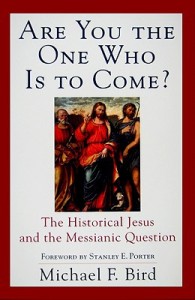For one whose surname is essentially “Messiah”, it is quite startling that the historical Jesus never actually out-and-out stated, “I am the Messiah.” This curious silence on the part of Jesus has led some corners of scholarship to conclude that, in fact, Jesus never conceived of himself as Israel’s Messiah, and that the messianic portrait of Jesus in the Gospel’s is a post-resurrection invention of the early church. Thus, in the book entitled Are You the One Who Is to Come?: The Historical Jesus and the Messianic Question, Michael F. Bird (fellow Patheos blogger) sets out to make sense of Jesus’ seemingly messianic reticence while at the same time challenging this serious charge against the early church’s so-called invented Christology. Bird states:
What I am going to do, rather, is argue that Jesus saw himself in messianic categories, as enacting a messianic role or a messianic vocation as part of his aim to renew and restore Israel through his various activities (pg. 29).
What I immediately appreciated was that Bird did not fall into the apologetic pitfall of merely proof-texting for passages that prima facia validate his pro-messianic assertions. Rather, he sets out to demonstrate, from within a “critical analysis of the authentic traditions in the Gospels,” that Jesus’ “intentions and identity” can be properly labeled as “messianic.” After all, if Jesus deliberately set out to evoke messianic categories, then this should be easily traceable within our most uncontested sources for the historical Jesus. Before accomplishing this task, Bird judiciously examines and details the various messianic expectations throughout Second Temple Judaism—as found in the Dead Sea Scrolls, the “messianic trajectory” of the Old Testament, Josephus, etc.—in order to reconstruct the proper register for hearing Jesus’ actions as consciously messianic. Bird concludes:
In Second Temple Judaism, messianic beliefs were diversified and perhaps even in the minority, but they were nonetheless recognizable and arose from a common pool of tradition (pg. 62).
Bird likewise drags out into the open the historical implausibility of an explicitly non-messianic Jesus who nevertheless manages to arouse the suspicion of the local authorities, spark messianic fervor from his followers, and land himself on a crucifix as a messianic pretender. Bird contends that this phenomena is best explained not by a non-messianic Jesus, but by a Jesus who intentionally sought out to evoke messianic hopes by way of his enigmatic use of Daniel’s “Son of Man,” his enactment of Isaiah’s “Anointed One,” his employment of the term kingdom, and the multiple allusions to David and Solomon that characterized his ministry. So, it’s not that Jesus repudiates any messianic identity, on the contrary, he sets out to “re-define” it while simultaneously allowing the aforementioned resonances to do their work. This thesis, in my opinion, has the ring of historical plausibility and therefore should be heard. He concludes rightly by stating:
Early Christianity has a testimony, that testimony is based on a memory, and the memory is of one who sought out to enact a specific vocation as Israel’s Messiah… I have chosen to speak of messianic claims, messianic actions, evoking messianic hopes, and a career that could be designated as performatively messianic (pg. 158).
Finally, Bird doesn’t step off the historian’s platform without drawing out the “theological implications,” namely, that Jesus as Messiah is the ultimate eschatological agent of deliverance, that as Christos he is inextricably linked to Israel’s sacred traditions and therefore to Israel herself, and the need to take serious how he as Christ functions between God and man. In sum, I whole heartily recommend this book that, despite its brevity, manages to deliver a convincing argument for a Jesus who clearly is responsible for the wide spread messianic suspicions, both positive and negative, that surrounded him before and after his death and resurrection.
———————————————
Lawrence is the Senior Teaching-Pastor of Academia Church in Goodyear, Arizona. He is a pastor devoted to the educational growth of his congregants, and the raising up of a new generation of disciples, who will think, tell, and live out the Christian story. Lawrence is currently attending Liberty University.












